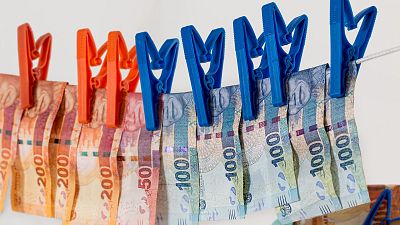Millions of implausibly registered legal structures pose a risk of money laundering or evasion of tax and sanctions, Euronews was told.
Europe is home to potentially millions of empty shell companies that could be used to evade taxes or sanctions, or launder money, recent data shows.
Now EU lawmakers are agitating for more to be done against those idle corporate structures, which potentially offer an escape from European taxes and sanctions against Russia.
Recent data from Moody’s shows nearly 5 million suspect companies in the UK alone, while the EU racks up nearly 4 million – with France and Cyprus leading the pack.
The analytics firm combed through hundreds of millions of companies and individuals to look for dubious data, such as lack of business activity and links to high-risk jurisdictions – and made some remarkable findings.
Thousands of listed company directors are, implausibly, recorded as being under five years old – and one Belgian firm is run by someone over 900 years old, the report found.
While such errors may be due to fat fingers on a keyboard rather than dodgy activity, they point to wider problems, Ted Datta of Moody’s told Euronews.
“It’s probably an indicator of a system that’s not been funded as well, or a system that isn’t as systematic as it might be,” said Datta, who heads the financial crime compliance team at the firm.
He noted a lack of resources at official registries like the UK’s Companies House – a deficiency that was “itself of concern, because it’s how you get into the financial system.”
Pyramid scheme
Some of the blame can be laid at the feet of lawyers and middlemen that help the super-rich to hide their wealth behind complex corporate structures, with little regulation and few checks, Datta said.
But things may be about to change, with newly agreed EU anti-money laundering rules requiring trust and company service providers to verify customer identities just as banks do.
The UK tax authority HMRC has also started fining some intermediaries for negligence, Datta noted.
But even he is stumped as to why some shell company data is quite so obviously spurious. There are more than 22,000 firms whose registered address is the Great Pyramids in Egypt.
Some argue there are legitimate reasons to set up shell companies – such as protecting corporate intellectual property, or to structure the investments of private equity firms.
The UK’s dubious accolade of topping the Moody’s table could mean it’s the most attractive location for money launderers – or could simply reflect the fact that the country is relatively transparent with its information, Datta said.
Equally, it’s natural that a big jurisdiction with many corporations would produce more alerts. If you look at the proportion of registered companies that raise red flags, and it’s places like Panama, Switzerland and Cyprus that lead the pack.
“The indicator itself is just what it says, it’s an indicator,” Datta said, adding that analysts must “look at the people behind a shell company ... to see if there’s other signs of nefarious activity”.
Lawmaker pressure
But EU lawmakers are pushing for action – and seem unworried about collateral damage in a market segment they see as having little value.
“I don’t see fairly strong reasons why you would have shell companies,” Paul Tang (Netherlands, Socialists and Democrats) told Euronews, citing their problematic impact on tax collection and Russian sanctions.
“We need to raise revenue by tackling tax avoidance, and shell companies are at the heart of it,” added Tang, who chairs the European Parliament’s tax committee. That politicians must tackle the issue is a “no brainer”, he said.
Tang favours new EU laws proposed by the commission in 2021 that would see companies with suspicious activity potentially deprived of tax benefits, based on their income, cross-border activity and governance.
The Unshell Directive, as it’s known, is a “very targeted instrument,” Tang said, only affecting a small fraction of companies.
But to pass into law, the proposal needs unanimous support from all 27 EU members – including the likes of Luxembourg, a major financial centre which the commission has accused of facilitating aggressive tax planning.
Governments have been dragging their feet on the issue.
Cross-questioned by Tang at a recent hearing, Belgian finance minister Vincent Van Peteghem said he wanted further analysis before moving the Unshell file forward, pointing to concerns over administrative burdens.
With current EU Council presidency holder Belgium rushing to wrap up a raft of legislation ahead of European elections in June, Tang said he hoped Van Peteghem would take another look at the file.
Too vague?
There’s still a genuine question about how you can screen companies for dubious activity using legislation.
Make the criteria too vague or broad, and it creates paperwork and legal uncertainty. Too precise – just pick companies with three or fewer employees, for example – and would-be money launderers can just hire a fourth.
Datta refers to this as “the infinite game,” played between enforcers of dirty-money rules, and those trying to bend or break them.
“What we try to do, and our customers try to do, is raise the cost” of obfuscating wealth, Datta said.
“Each year, each regulation, each new bit of insight just makes it more difficult, puts more people off,” he said. “That’s all you can really do.”



